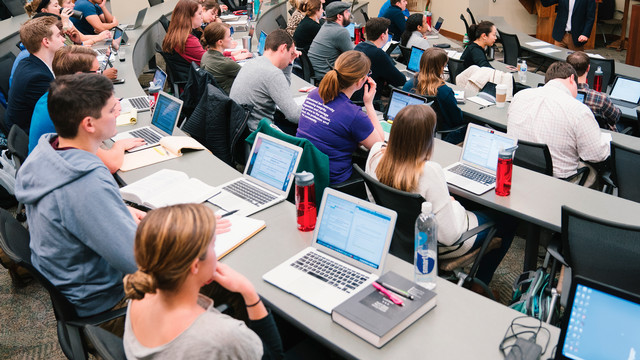Forum
AI is on our minds at UR

There is a lot of talk these days about artificial intelligence: what it is, what it isn’t, and what it might be. Some are anxious that AI will diminish the value of liberal arts education and the role of universities like ours. I am not.
A liberal arts education is as valuable today as ever. Through a rigorous exploration of the liberal arts, students gain a greater understanding of the world and hone communication, critical thinking, and problem-solving skills to navigate it. The type of liberal arts experience Richmond offers is particularly transformative. We keep class sizes small. Our staff and faculty provide close personal attention and mentoring relationships. Spiders live, learn, and grow in a tight-knit community. Every undergraduate can receive financial support for internships, faculty-mentored research, and study abroad. They can explore pathways that align with their interests and access lifelong assistance from our career development team, starting from their first semester.
For all these reasons and more, every year a record-breaking number of remarkable students clamor to come to Richmond to engage in rigorous academic study and pursue life-changing opportunities. For some time now, we have been considering how AI can contribute to our continued momentum and what new skills and knowledge our students might need for continued success.
Key work is already underway. Our technology consultants in the Weinstein Learning Center offer personalized training to help students practice with AI and develop AI literacy. AI topics have also been integrated into a variety of course offerings — from first-year seminars to graduate courses in business and law. And faculty across all five of our schools are embarking on collaborative explorations of AI, sharing ideas and best practices through the university’s Faculty Hub and the new Center for Liberal Arts and AI (CLAAI).
Aside from these first steps, there’s a lot to think about. The outer bounds of what AI is and discussions around the ethics of use are rapidly evolving. We must continue to ask, “What role could these technologies play at Richmond?” and “What else might our students need to learn to succeed and flourish?” That’s why I’ve asked a small, dedicated group of staff and faculty, the Presidential Advisory Group on AI, to consider additional applications for AI across university departments and advise on further integration.
It’s natural to feel both wary and excited when thinking about emerging technologies. They present opportunities and have limitations. They come with both costs and benefits. But universities operate at the frontiers of knowledge. Our communities make discoveries that expand human understanding, and we educate the next generation who will shape our future. Many things already make a Richmond education so valuable. As we move forward, we will continue to explore where and how new opportunities — like access to AI — could advance our work.
